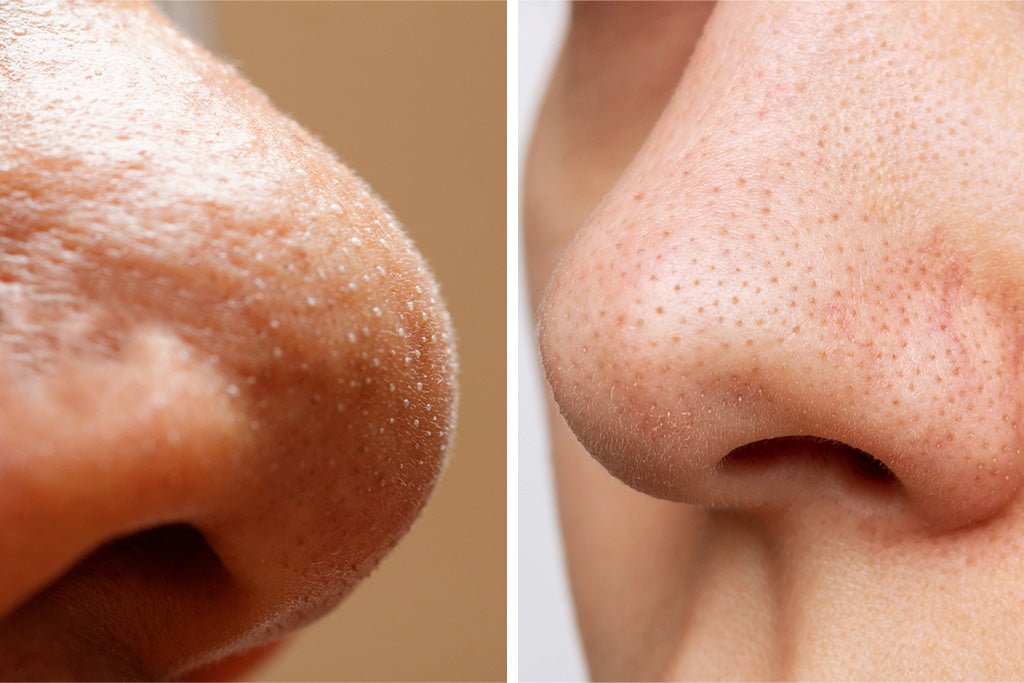In This Article
Introduction
When it comes to achieving clear and healthy skin, understanding the difference between blackheads and whiteheads is essential. These two common types of acne are often mistaken for one another, leading to improper treatment and frustration. By grasping their distinctive characteristics and causes, you can develop a tailored skincare routine to effectively combat them. In this blog, we will delve into the dissimilarities between blackheads and whiteheads, their causes and provide useful tips for clearer skin.
Whiteheads: The Culprits Behind Closed Pores

Whiteheads, also known as closed comedones, are small, flesh-coloured or white bumps that appear on the skin's surface. They occur when the hair follicles become clogged with oil, dead skin cells, and bacteria, leading to a closed pore. As a result, the accumulation of sebum and dead skin cells creates a white or yellowish plug that blocks the follicle, preventing it from opening to the skin's surface. Let’s understand what causes whiteheads:
Causes of Whiteheads
The primary causes of whiteheads include hormonal fluctuations, excessive oil production, poor skincare routine, and certain medications. Hormonal changes during puberty, menstruation, and pregnancy can also increase sebum production, contributing to the formation of whiteheads. Additionally, using comedogenic skincare products, failing to cleanse the skin thoroughly, and wearing heavy makeup can exacerbate the occurrence of whiteheads.
Treatment and Prevention of Whiteheads

To treat and prevent whiteheads, it is crucial to follow a comprehensive skincare routine. Here are some effective strategies:
Cleansing: Use a gentle cleanser twice a day to remove excess oil, dirt, and dead skin cells from the skin's surface. Be sure to stay away from cleansers that may be too harsh on your skin and strip away the natural oils from your skin, as this can trigger more sebum production.
Exfoliation: To remove dead skin cells and unclog pores regular exfoliation is key. Choose gentle exfoliants with ingredients like salicylic acid or alpha-hydroxy acids (AHAs) to promote cell turnover and prevent the formation of whiteheads. Using gentle serum based exfoliators or clay masks is better than scrub cleansers which can damage the skin barrier.
Moisturising: Even if you have oily skin, it is essential to moisturise regularly to maintain the skin's hydration levels. Opt for non-comedogenic moisturisers that won't clog the pores.
Avoid touching the face: Touching your face frequently can transfer bacteria, dirt, and oil to the skin, leading to clogged pores and whiteheads. Avoid unnecessary touching and always ensure your hands are clean when you need to touch your face.
Blackheads: The Open Pore Predicament

Unlike whiteheads, blackheads (or open comedones) are characterised by small, dark or black bumps on the skin's surface. They occur when the hair follicles become partially blocked, allowing the clogged material to oxidise when exposed to air. This oxidation process gives blackheads their dark appearance. Let’s understand what causes blackheads:
Causes of Blackheads
Similar to whiteheads, blackheads are caused by excess sebum production and the buildup of dead skin cells. However, blackheads differ in that the pore remains open, allowing the material to oxidise and darken. Factors such as hormonal imbalances, genetics, and certain environmental factors, like humidity and pollution, can contribute to the development of blackheads.
Treatment and Prevention of Blackheads

To effectively treat and prevent blackheads, consider incorporating the following steps into your skincare routine:
Cleansing: As with whiteheads, thorough cleansing is essential. Using a pH balanced cleanser that is gentle and light, twice a day to removes excess oil, dirt, and dead skin cells. Also, do not scrub your face in a harsh maner, as it can irritate the skin and worsen the condition.
Exfoliation: Regular exfoliation is crucial in preventing the buildup of dead skin cells and unclogging pores. Using a gentle exfoliant with ingredients such as Glycolic Acid (AHA), Lactic Acid (AHA) or Salicylic Acid (BHA) to remove dead skin cells and promote cell turnover.
Extraction: If you have stubborn blackheads, consider a professional extraction by a dermatologist or esthetician. They can safely remove the blackheads using specialised tools, minimising the risk of scarring or infection.
Retinoids: Topical retinoids, derived from vitamin A, are effective in treating and preventing blackheads. They help regulate cell turnover, reduce oil production, and promote the unclogging of pores. Consult with a dermatologist to determine the appropriate strength and formulation for your skin.
Sun Protection: Protecting your skin from harmful UV rays is crucial in preventing blackheads. Use a broad-spectrum sunscreen with at least SPF 30 and apply it daily, even on cloudy days.
Use SkinQ’s Oil Control Mask - this dermatologist-formulated and tested face mask is a French Green Clay mask that absorbs excess oil and clears the skin, giving it an even tone with weekly usage. It is enriched with ingredients such as Mandelic Acid and Saw Palmetto to control oil secretion, unclog pores and help to reduce whiteheads & blackheads.
Conclusion
Understanding the difference between whiteheads and blackheads is essential for achieving clearer and healthier skin. Whiteheads are closed comedones caused by clogged pores, while blackheads are open comedones that occur when the pore remains partially blocked. By implementing a comprehensive skincare routine that includes regular cleansing, exfoliation, moisturising, and sun protection, you can effectively treat and prevent both whiteheads and blackheads.
Remember, consistency is key when it comes to skincare. Be patient and give your skin time to adjust to new products and routines. If your acne persists or worsens, it is advisable to seek professional advice from a dermatologist who can provide personalised recommendations and treatments. With proper care and attention, you can achieve the clear and radiant skin you desire.

